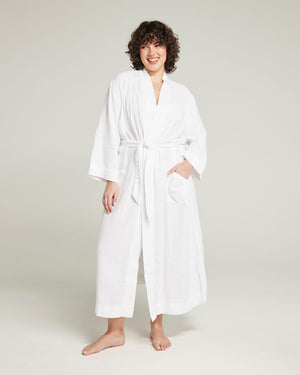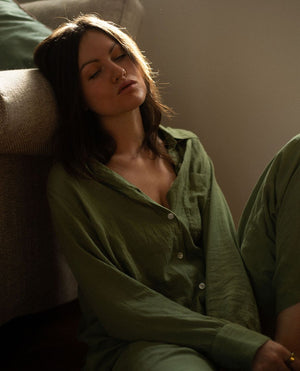When it comes to health, there’s one thing we all need but sometimes struggle to get: sleep. It’s the magic ingredient that keeps us going, yet so many of us struggle to achieve a perfect night of uninterrupted slumber. Nearly one in five people in the UK are in desperate need of more sleep, while 74% of adults have seen their sleep quality dip between 2022 and 2023. We all know we need it, but why is it so hard to achieve? Given the fact that you spend about a third of your life in bed the importance of making those moments the most cosy and comfortable they can be is seriously underrated.
According to Dr. Lucy McCann, Honorary Clinical Research Fellow at the Wolfson Institute of Population Health, adults need "seven to nine hours" of sleep each night. Sounds simple, right? Yet, the average British adult is only managing as little as 5.91 hours. But it’s not just the time we spend in bed that matters; it’s how good that sleep actually is and luckily there are several ways to give yourself the best chance at a restful night.

Dr Lucy McCann
Choosing the right fabrics
"Good-quality sleep includes being able to fall asleep relatively quickly, not frequently waking up, and being comfortable in bed," McCann explains. Comfort is key here, and the materials we snuggle up in can make all the difference. Opting for more natural breathable fabrics like organic cotton can drastically improve your hours under the covers as they keep your body cool, comfortable and dry throughout the night.
Optimising your routine
Beyond creating a comfy environment, good sleep habits (aka sleep hygiene) are crucial to getting that elusive good night’s rest. Dr. McCann is all about routine: "Going to bed and getting up at the same time both during the week and at weekends. Regularity is one of the best things you can do." Engaging in relaxing activities before bed, such as reading, meditation, or gentle stretching, can signal to your body that it's time to wind down. "Establishing a calming pre-sleep routine helps transition your mind and body from the busyness of the day to a state conducive for sleep," McCann advises. Another top tip? Keep your room cool. "Our bodies are designed to sleep at a lower core temperature," says McCann, adding that 18℃ is the sweet spot.
To further enhance your night and optimise your sleep, Dr. Lucy McCann suggests a few additional strategies. The first step is to limit exposure to blue light an hour before bed. "Blue light emitted from screens can trick your brain into thinking it’s still daytime, making it harder to fall asleep," Dr. McCann notes. She recommends minimising screen time at least an hour before bed.
The power of natural light
Lastly, don’t underestimate the power of morning light exposure. Dr. McCann emphasises the importance of getting natural light exposure early in the day. "Morning light helps regulate your circadian rhythm, which is your body’s natural sleep-wake cycle. It can improve your sleep quality by helping your body recognise when it’s time to be awake and when it’s time to sleep," she explains.
By combining these practices with a consistent sleep schedule, a cool, comfortable environment, and quality bedding, you can transform your nights and enjoy the restorative sleep your body craves.


















































































